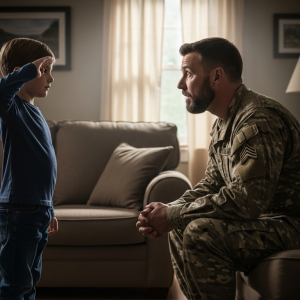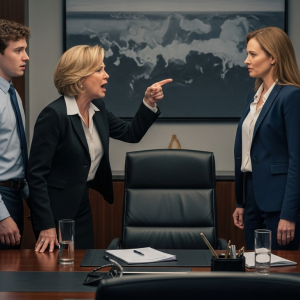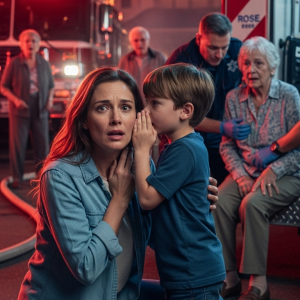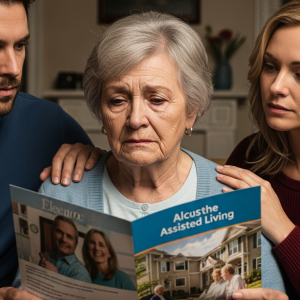I called my son from a hospital bed, and he asked if it could wait until after his wife’s birthday. It was 11:12 a.m. on Memorial Day. The sun poured through the window, a brilliant, indifferent sheet of light that hit me right in the eyes. I couldn’t make out Nurse Julia’s face when she asked if I wanted another blanket.
I nodded. Not because I was cold, but because something heavy inside my chest had just dropped, silently and without a sound. The last time I’d called an ambulance, it was for my husband, Gerald. This time, it was for me—heart racing, palms slick with a cold sweat, hands shaking uncontrollably.
When the paramedic asked for my birth year, my mouth answered, “1956,” but my mind drifted to the fact that my mother was still alive that year, a ghost of a memory. In the ambulance, the EMT asked if they should notify any children. “Yes,” I said, my voice thin. “Just one.”
I gave them his number. They called and left a message. I stared at the soft green light blinking on the heart monitor, each pulse marking one of 67 years. When it truly mattered, there was only one number I could think to dial, and no one had answered.
At the ER, they laid me down gently. Nurse Julia, with her soft brown hair and kind eyes, clipped monitors to my chest. “Ma’am, I need you to stay calm for me. Can you do that?” I nodded, saying nothing. I had no words left worth saying.
At noon, Julia brought a food tray: a cup of watery orange Jell-O, bland white porridge with no salt, and a glass of cold water without ice. My name was printed on a slip of paper on the tray, but the ink was already fading, just like I was.
My phone buzzed. Derek. I let it ring once before answering, bracing myself. Loud music bled through the receiver, the clinking of glasses, a woman’s sharp laughter. Someone shouted, “Happy birthday, Lynn!” Derek’s voice came through, strained and distant. “Hey, Mom. Is something wrong?”
I looked up at the stained white tiles of the ceiling. “I’m at the hospital,” I said. There was a pause. I could hear Lindsay laughing in the background, someone singing off-key to a pop song. “Oh. What happened? Mom, we’re already at brunch for Lindsay. Is it okay if I call you after?”
I took a quiet breath, the antiseptic air filling my lungs. “Go,” I said. “Take care of Lindsay.” He said something else, but his voice was rushed, like I was just another task on his to-do list, an inconvenience that had called at the worst possible moment.
“You’ll be okay, right?” he asked, his final words before hanging up. “I’ll call you after the party.” I didn’t answer. I didn’t wait for the call, either. On a calendar taped to the wall, a bold red circle marked Lindsay’s special day. I remembered when Gerald used to do that for me, but with blue ink on a scenic calendar that now only existed in my memory.
As the day wore on, I saw Julia scribbling notes at the nurse’s station, her focus absolute. I turned to face the wall. Dinner was more porridge, cold this time, the Jell-O still untouched. No one came to take the tray away.
My phone remained silent. No new messages. I opened Instagram, an app I rarely used but knew how to navigate. There she was: Lindsay, radiant in a white dress, holding a bouquet of lilies. Behind her, a heart-shaped cake sat on a table surrounded by laughing friends and warm, festive lights.
The caption screamed in all caps: “BEST. BIRTHDAY. EVER. #luckywife.” I turned my phone face down on the scratchy hospital blanket. My gaze fell to the uneaten Jell-O on the tray, its bright orange color reminding me of how Lindsay’s hair looked when she’d dyed it ombré. I once told her it was beautiful.
Later, Julia returned. “Would you like to see the doctor before you’re discharged?” I shook my head. “Tomorrow is fine.” She gave me a gentle, pitying smile. “Will someone be coming to pick you up, dear?” she asked. “Probably not,” I said, my voice steady. “But I can call a cab.” She nodded, a professional kindness in her eyes, and didn’t ask anything more. I didn’t cry. It was worse than that. I felt as if I had simply disappeared.
Even after I returned, the house felt cavernous, hollowed out by the absence of a son. I paid the taxi driver in cash and stood at my own front door. I knew exactly where the key was—under the small potted plant by the step—but a part of me hesitated, still foolishly believing I shouldn’t have needed it.
The air smelled of damp earth and decay. Wet leaves clung to my shoes. The taxi pulled away, its red tail lights vanishing into the drizzle. No one came to open the door. I bent down, lifted the pot, and retrieved the same key Gerald and I had used for thirty-eight years. The click of the lock sounded brittle and final in the silence.
Inside, the house was cold, a chill that had nothing to do with the weather. The kitchen was spotless, as if no one had cooked a real meal in days. I set my bag on a wooden chair, and it creaked in protest, as if I were an intruder in my own home.
I went to boil water for tea, reaching for Gerald’s favorite mug—ivory white, rimmed with blue. A small crack spiderwebbed from the handle. I’d always meant to glue it. As the kettle hissed, I turned on the radio. A calm voice on NPR was discussing the housing market, how young people were struggling to afford their first homes. The words echoed in my empty living room, and a cold realization settled over me: this home I stood in was likely already part of someone else’s plans.
A knock at the door startled me. It was my neighbor, Rose, holding a pie tin wrapped in plastic. “I saw the kitchen light,” she said, her eyes kind but sharp. “Didn’t think you were home yet.” I stepped aside to let her in. “I got back this morning.”
“No one came to pick you up?” she asked, her tone gentle but knowing. I just shook my head. She peered into the house, her gaze taking in the stillness. “I made a peach cobbler. Thought you could use some. Helen… folks have been talking.”
I tilted my head, waiting. “It’s Lindsay, your daughter-in-law. I overheard her at the café last week, talking to a realtor. She was asking about this house… spoke about it like she already owned the place.”
I didn’t react, just led her to the kitchen. As I sliced the warm cobbler, Rose sighed. “Kids these days. Can’t even wait for you to settle before they start eyeing up the inheritance.”
After she left, I went upstairs. The bedroom was just as I’d left it, but one drawer on the old wooden dresser was slightly ajar. I knew I hadn’t left it that way. I pulled it open. Inside was a worn, ivory-colored envelope. In Gerald’s familiar blue ink, the words read: Helen, open only when you need to.
My hands were steady as I opened it. A single sheet of paper was folded inside. “If I go first,” he had written, “don’t let anyone move you from this house unless it’s your choice. You’re the one who holds the last light.” I read it twice. The words weren’t just comfort; they were a warning. A final, protective command. I went back downstairs, opened my desk, and looked at the deed to the house. It was still there. Still in my name.
A few days later, my granddaughter Emily was in my kitchen. “Grandma,” she began, her spoon hovering over a bowl of pancake batter, “when Mom said I just need to stay with you until the end of the year, what did she mean?”
I froze, the batter clinging to my fingertip. The only sound was the steady tick of the wall clock. “What did she mean, Grandma?” she asked again, her voice softer but firm, her eyes holding mine with an unnerving maturity. I wiped my hands. “I’m not sure, sweetheart.”
That morning, Derek video-called. Lindsay’s face appeared first, her hair wrapped in a towel at what looked like a spa. “Hi, Mom,” she said quickly, then turned the phone to Derek. “You and Emily doing something fun?” he asked. “Pancakes,” I said. “Good. I’ll call back later. A bit busy.” The call lasted 28 seconds.
That evening, while I was folding laundry, Emily approached me, holding a small, black USB stick with a note taped to it. “Mom doesn’t know I have this,” she whispered. “The note says you should listen to ‘Thursday Night’.”
After Emily was asleep, I plugged the USB into my laptop. One audio file. I put on headphones. The recording began with the sound of running water, then Lindsay’s voice, tense and sharp. “As soon as she signs, it’s done. You said she doesn’t really understand these things, right?”
Derek’s voice was low, conspiratorial. “I don’t think so. But she’s been… different lately.”
Lindsay let out a short, sharp laugh. “Different how? She’s always quiet. That’s our advantage. That house is just step one. Then we roll it all into a property closer to the city, and Emily gets into that charter school. It’s for the best.”
I took off the headphones. My body didn’t tremble. My breath didn’t catch. I just sat in the profound, ringing silence. A soft knock came at my door. Emily peeked in. “You listened?” I nodded. “You heard the whole thing?” She nodded back, her young eyes fixed on mine, full of a sorrow she shouldn’t have had to carry. I opened my arms, and she rushed in, holding onto me tightly, as if she knew I was strong, but might already be breaking.
I called my son from the hospital; he didn’t come. Three weeks later, I called my lawyer and sold the house he was certain he would inherit.
Alan McKinnon’s office still smelled of old paper and lemon wax. I had been here once before with Gerald, years ago. Now, I was alone. Alan pulled out a chair. “Helen,” he said gently, “before we proceed, are you absolutely sure?”
I reached into my purse and placed two items on the polished glass table: Gerald’s old envelope, and the USB Emily had given me. “I don’t need to say anything,” I told him. “It’s all in here.”
He plugged in the USB, his eyes scanning the transcript of the recording. When he read the line, “…once she signs, it’s all ours,” he let out a short, sharp exhale. While he worked, I looked out the window at the heavy clouds, at a world that didn’t know someone was letting go of a lifetime.
“What’s your plan?” he asked, his voice soft.
“Sell the house,” I said, my tone crisp and clear. “Put everything into a trust for Emily, accessible only when she’s of age. No access for Derek. No notice to Lindsay.”
He looked at me, a question in his eyes. “I’m tired of replying to texts about Sunday dinners that they never intend to come to,” I explained. He nodded and began writing. He showed me where Gerald had left my name as the sole owner—a quiet way of handing me a sword I’d once refused to hold.
“Sign here,” Alan said, pointing to the line. I picked up the pen. There was no hesitation. My signature was straight and sure. As I stood to leave, Alan asked one last time, “Are you sure you won’t say anything to Derek?”
I looked him straight in the eye. “If I say it out loud, Alan, I’ll soften. And I can’t afford to be soft anymore.”
They knocked on the door with flowers and a late, hollow apology. I didn’t answer. Instead, I let my lawyer hand them the envelope.
Alan stood at the foot of the steps, holding the thick manila envelope sealed with red wax. Derek held a bouquet of white lilies, shifting his weight. Lindsay stood beside him, perfectly put-together, her red lips a tight line. She looked at Alan as if he were a messenger who could be swayed.
I watched from behind the living room curtain. The house was nearly empty, an echo of what it once was. Emily stood on the stairs, her hand on the railing, a silent sentinel.
Derek ripped the envelope open. His eyes scanned the first page—a copy of Gerald’s letter. His hand tightened, but Lindsay snatched it from him, flipping through the sale confirmation, the trust documents, and finally, the transcript from the USB.
Her face went pale. “You created a trust?” she hissed, her voice sharp with disbelief and fury.
I stepped out from the shadows. “Not for me,” I said, my voice even. “For the only person in this family who still looks at me like I’m human.” Emily took one step down, aligning herself with me.
Lindsay forced a strained, ugly smile. “You should have talked to us first, Helen.”
I met her gaze without flinching. “My son should have come to the hospital.”
Lindsay’s eyes hardened. “You don’t think Emily will resent you for this? You’re putting her in the middle, taking her parents away!”
“No,” I answered slowly, letting each word land. “I think she’ll learn how to live without bowing to toxic love.” Emily’s small, cold hand found mine and squeezed. The room fell silent. Lindsay, defeated, yanked Derek’s arm. “Let’s go.” Her eyes were glassy not with sorrow, but with the bitter taste of loss. As they left, Derek didn’t look at me, but he gave Emily a fleeting, unreadable glance before the door shut, sealing them out forever.
On my first morning in the new apartment, the sunlight was soft, like a hand stroking my hair. The kitchen was small, the walls painted cream. There were no ghosts here, no expectations hanging in the air. I made tea and sat by the open window, the breeze carrying the scent of lavender from a neighbor’s garden.
My phone buzzed. It was Rose. “I heard you moved,” she said warmly. “That quiet little area near Hazel’s Corner? Gerald used to love that place.” No one mentioned Derek. There was no need.
A few days later, a letter came from Emily’s school. She had requested a change of residence. The reason was typed neatly: Living with Helen (Grandmother). But my name, Helen, was handwritten in the purple ink I had taught her to use.
That Friday evening, she knocked on my door, a backpack on her shoulders and a small suitcase at her feet. She walked in not as a guest, but as someone coming home. We didn’t say much. We planted a lavender pot on the balcony together, our hands covered in fresh soil.
That night, after she fell asleep, I stood before the bathroom mirror. My face was tired, the lines deeper than I remembered. But for the first time in a long, long time, my eyes were clear. My gaze was my own.
I looked at the reflection of the woman who had finally found her voice and whispered, “Hello, Helen. It’s good to finally meet you again.” What I carried with me from that old house wasn’t furniture, but the silence that had finally turned into resolve. I used to think sacrifice was the same as love. Now I know that if you don’t stand tall for yourself, even your own family will grow used to looking down on you.




